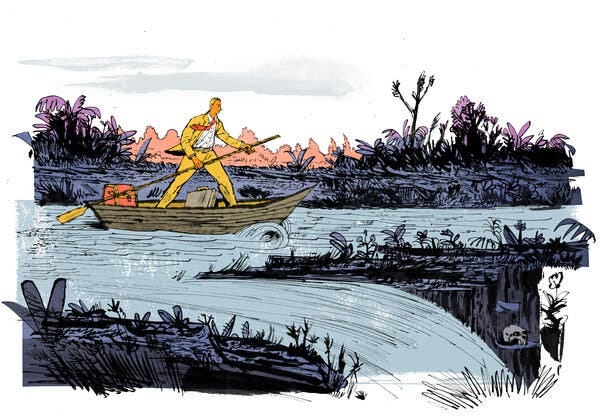Welcome to another edition of “Students of Leadership” today we reflect on the words of Otto von Bismarck “politics is the art of the possible, the attainable, the art of the next best."
In the world of leadership (like in many aspects of life), aspirations often clash with real-world constraints. “The Art of the Possible” remains as a guiding principle that epitomizes effectiveness and pragmatism. It is the capacity to set achievable objectives and deliver on them.
Origin of "Art of the Possible"
The concept of the "Art of the Possible" has deep historical roots, but it finds its modern association with the 19th-century German statesman, Otto von Bismarck. Bismarck, celebrated for his role in uniting Germany, who famously asserted that politics is "the art of the possible, the attainable, the art of the next best." This statement encapsulates the essence of pragmatic leadership, emphasizing the pursuit of practical solutions over unattainable ideals.
On the contrary, famous economist Kenneth Galbraith provided a contrasting perspective, stating, "Politics is not the art of the possible. It consists in choosing between the disastrous and the unpalatable." We can read this alternative viewpoint as a cynical view of politics or as a viewpoint that underscores the difficult choices that leaders often face when navigating complex situations.
The “art of the possible” should be seen as a positive concept; it ultimately suggests intelligence, common sense, and an ability to work within the system. Dealing effectively within the realms of the possible in order to make things happen is the mandate of any good leader.
This is to me what “politics” at work is all about, the rest of what people often call “politics” is not such, it typically is the love of gossips and the display of toxic behaviors.
There is a great 2022 Harvard Business Review (HBR) article titled “Office Politics don’t need to be Toxic” by Madeleine Wyatt and Elena Dolor that talks about how office politics might seem unpleasant, but the ability to build relationships, access opportunities, and influence others is critical for anyone’s professional development.
“The authors describe how toxic organizational cultures can lead employees to disengage from the political arena, ultimately harming their career prospects, while inclusive cultures can foster participation in healthy office politics.”
Toxic cultures lead to disengagement from office politics
“You need to make sure that you’ve got supporters within the organization and that you know how to network well.”
Their research identified five strategies to help organizations foster healthier office politics cultures, in which all employees are nurtured and supported:
Be transparent
Ensure access to informal career development resources
Reframe politics positively
Leverage politics to drive inclusion
Share success stories
They conclude: Office politics has long served as a mechanism for exclusion — but it doesn’t have to. While the negative impact of toxic politics on ethnic minorities and women in the workplace is well known, our research shows that it is possible to build inclusive political cultures, in which politics are instead leveraged for common good. With a thoughtful, inclusive approach, organizations can help all their employees engage and reap the benefits of office politics.
10 leadership lessons from “the art of the possible” philosophy:
Set Realistic Goals:
Effective leaders understand the importance of setting objectives that are both ambitious and attainable. Realistic goals provide a solid foundation for tangible achievements.
Pragmatism Over Idealism:
While ideals may inspire, practicality drives results. Pragmatic leaders prioritize solutions that can be implemented in the real world, while keeping sight of the bigger vision.
Collaboration and Compromise:
Leadership requires collaboration with diverse stakeholders and leaders must excel at building alliances, finding common ground, and skillfully navigating compromise to achieve their objectives.
Adaptability:
Environments evolve, and leaders must adapt their strategies accordingly. Adaptability enables leaders to address changing circumstances with agility and solve problems in context.
Communication Skills:
Effective leaders communicate with clarity and conviction, engaging their team and stakeholders and rallying support through persuasive rhetoric.
Resilience:
Leadership is a journey full of challenges. Resilience is essential for weathering adversity and emerging stronger from setbacks.
Ethical Leadership:
Upholding ethical standards is non-negotiable. Leaders must lead with integrity to earn the trust and respect of their team and peers.
Understanding the System:
Successful leaders comprehend the intricacies of the systems in which they operate. This knowledge empowers them to navigate complexity effectively.
Long-Term Vision:
Pragmatic leaders maintain a long-term perspective that extends beyond immediate gains. Their commitment to the greater good guides their decisions.
Courage to Choose!!
Leaders often face difficult choices between imperfect options. Courage is essential to make decisions that align with the best interests of their organization.
Work on developing smart politicians and watch closely as culture evolves to prevent toxic politicians to gain ground, otherwise they will turn your team and organization into what Steve Job described below
Conclusion
In the world of leadership, where vision must meets practicality, mastering the "Art of the Possible" remains a cornerstone of being an effective leader. It involves striking a balance between visionary aspirations and pragmatic action. By embracing these principles, leaders can create and thrive in high-performance environments to achieve results that leave a profound and enduring impact on their organizations and the broader world.
BONUS TRACK : IMPROMPTU VISIT BY “THE CONTRARIAN”
Politics may be the art of the possible, but almost everything worth pursuing, worth giving it all with passion and purpose often encounters a solid “that’s impossible.”
A very good leader will unlikely settle for the best possible, and will always find motivation in the challenge that those words present, relentlessly working to make the impossible a reality.
Politics may be the art of the next best, but with purpose and determination leadership seeks to leverage all at its disposal to always create the first-ever!
P.S. Before I go, here you have “The Treat,” where I share some of the music that kept me company while writing … Enjoy as you bid farewell to this post
“Lead yourself, Learn to live. Lead others, Learn to Build.”
If you enjoyed reading this post consider subscribing to the newsletter for free, joining the community and sharing your thoughts.








